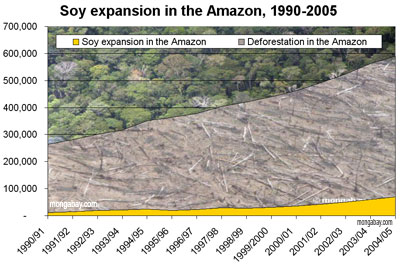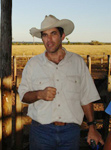Agricultural giant Archer Daniels Midland Co. (ADM) has partnered with Brazilian nonprofit Aliança Da Terra to promote better environmental stewardship among soybean producers operating in the Amazon, reports the Chicago Tribune.
The program, Produzindo Certo or “doing it right,” aims to help farmers boost their yields in order to minimize the need to expand operations into ecologically sensitive areas. It also sets standards to ensure good working conditions for employees.

Soy expansion in the Brazilian Amazon, 1990-2005 Total deforestation and area of soybean cultivation across states in the Brazilian Amazon. Overall soybean cultivation makes up only a small portion of deforestation, though its role is accelerating. Further, soybean expansion and the associated infrastructure development and farmer displacement is driving deforestation by other actors. Note: some soybean farms are established on already degraded rainforest lands and neighboring cerrado ecosystems. Therefore it would be inappropriate to assume the area of soybean planting represents its actual role in deforestation. |
ADM has launched the program at a time when it faces heated criticism from activist groups for its environmental performance. Last year the San Francisco-based Rainforest Action Network linked ADM to forest conversion for soy farms in the Amazon and oil palm plantations in southeast Asia. While there has been a moratorium on direct conversion of forest for soy in the Amazon since 2006, some analysts say soy continues to be an important indirect driver of deforestation in the Brazilian Amazon by driving up land prices and creating an impetus for infrastructure improvements that promote forest clearing. In areas where soils and topography are suitable for mechanized soy cultivation, rainforest lands are typically cleared for low-intensity cattle ranching then sold to soy producers some two to three years later. Ranchers then move into frontier areas, spurring deforestation.
Aliança Da Terra, an environmental NGO founded by an American rancher named John Cain Carter, aims to improve environmental performance among ranchers and farmers operating in Amazonia. The group has developed a certification system which it hopes will enable environmentally responsible producers to receive a premium for their products.
Related articles

|
John Cain Carter, founder of Brazilian NGO Aliança da Terra — 06/06/2007John Cain Carter, a Texas rancher who moved to the the Brazilian state of Mato Grosso 11 years ago and founded what is perhaps the most innovative organization working in the Amazon, Aliança da Terra, believes the only way to save the Amazon is through the market. Carter says that by giving producers incentives to reduce their impact on the forest, the market can succeed where conservation efforts have failed. What is most remarkable about Aliança’s system is that it has the potential to be applied to any commodity anywhere in the world. That means palm oil in Borneo could be certified just as easily as sugar cane in Brazil or sheep in New Zealand. By addressing the supply chain, tracing agricultural products back to the specific fields where they were produced, the system offers perhaps the best market-based solution to combating deforestation. Combining these approaches with large-scale land conservation and scientific research offers what may be the best hope for saving the Amazon. |
Future threats to the Amazon rainforest
(07/31/2008)
Between June 2000 and June 2008, more than 150,000 square kilometers of rainforest were cleared in the Brazilian Amazon. While deforestation rates have slowed since 2004, forest loss is expected to continue for the foreseeable future. This is a look at past, current and potential future drivers of deforestation in the Brazilian Amazon.
Amazon soy moratorium extended; may be expanded to other products
(06/23/2008)
Soy crushers operating in the Brazilian Amazon have extended a two-year-old moratorium on the purchase of soybeans produced on rainforest lands deforested after 2006, reports Reuters.
Amazon beef producer creates eco-certified meat product with help of scientists
(06/08/2008)
Independencia Alimentos SA, Brazil’s fifth-largest beef producer, will create an “eco-certified”, branded beef product from the Amazon’s Xingu region. Certification will be based on criteria established by Alian?a da Terra, an Brazilian NGO that seeks to improve the environmental performance of ranchers and beef producers in the world’s largest rainforest. The new beef product will include a per-kilo “ecosystem service fee” — calculated with the help of scientists at the Woods Hole Research Center — to facilitate a financial reward for the producer’s environmental stewardship.
‘Soy King’ says Amazon deforestation could help solve global food crisis
(04/28/2008)
Clearing the Amazon rainforest for soy farms will help address the global food crisis, said Blairo Maggi, the governor of Brazil’s chief soy-producing state, according to the Folha de Sao Paulo newspaper.
Amazon soy ban seems to be effective in reducing explicit deforestation
(04/03/2008)
An industry-led ban on soy production in the Amazon appears to be proving effective at reducing new clearing for explicit soy production, according to a survey published Monday by Greenpeace and the Brazilian Vegetable Oils Industry Association. The moratorium, which was signed by some of the largest soy crushers in the Amazon in response to a campaign by environmental group Greenpeace, went into effect in October 2006. While soy is believed to be having an indirect impact on deforestation by driving up land prices and competing with the dominant form of land use in the Amazon — cattle ranching — the news is a hopeful sign for conservationists.














